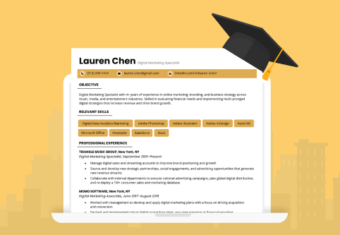NOTE: This page is regularly updated to include new data and best reflect current hiring trends. We outline our methodology and provide a bit of context about who we are at the end of the report.
If you’re exploring a practical and efficient route to a successful career, getting an associate degree is a great option.
These 2-year degrees can open doors to several work opportunities with excellent earning potential, especially when combined with relevant work experience, training, internships, and certifications.
Below is a list of high-paying jobs with promising job growth projections that you can pursue with an associate degree:
| Job | Median Annual Salary | Number of Jobs | Estimated Job Growth |
|---|---|---|---|
| Air traffic controller | $132,250 | 23,000 | 1% |
| Nuclear technician | $100,420 | $100,420 | -1% |
| Radiation therapist | $89,530 | 15,900 | 2% |
| Nuclear medicine technologist | $85,300 | 18,100 | 0% |
| Dental hygienist | $81,400 | 219,400 | 7% |
| Diagnostic medical sonographer, cardiovascular technologist/technician | $78,210 | 142,800 | 10% |
| Aerospace engineering and operations technologist/technician | $74,410 | 10,200 | 8% |
| Aircraft and avionics equipment mechanic and technician | $70,740 | 161,000 | 4% |
| Respiratory therapist | $70,540 | 133,100 | 13% |
| Radiologic and MRI technologist | $67,180 | 264,100 | 6% |
1. Air traffic controller
- Median annual salary: $132,250
- Number of jobs (2022): 23,000
- Estimated job growth (2022–2032): 1%
Job responsibilities for air traffic controllers
Air traffic controllers keep aircrew and passengers safe by managing the flow of air traffic. Some of their tasks include giving pilots updates on weather, flight paths, and runway information to ensure safe takeoffs and landings.
They’re also responsible for alerting emergency services and helping to prevent air traffic delays by directing planes and analyzing flight data.
How to become an air traffic controller
To get started as an air traffic controller for the Federal Aviation Administration (FAA), you must be a U.S. citizen, be under 31, have an associate degree in this field or the equivalent of three years of work experience, and be willing to relocate as needed.
The hiring process also includes passing the Air Traffic Skills Assessment, medical and security screenings, and completing intensive training by the FAA.
2. Nuclear technician
- Median annual salary: $100,420
- Number of jobs (2022): 5,900
- Estimated job growth (2022–2032): -1%
Job responsibilities for nuclear technicians
Nuclear technicians work with physicists, engineers, and various professionals to conduct nuclear research and help produce nuclear energy.
They typically operate from offices and control rooms within nuclear power plants, and use computers and specialized equipment to monitor and manage nuclear reactors.
How to become a nuclear technician
To become a nuclear technician, you can start by getting an associate degree in nuclear science, nuclear technology, or a related field. Once hired, new nuclear technicians undergo extensive practical training to learn more about the necessary operational, safety, and regulatory procedures.
3. Radiation therapist
- Median annual salary: $89,530
- Number of jobs (2022): 15,900
- Estimated job growth (2022–2032): 2%
Job responsibilities for radiation therapists
Radiation therapists work closely with medical teams to provide targeted radiation treatment for patients with cancer and other serious diseases. They plan and deliver radiation therapy, while also ensuring procedures are done accurately and safely.
How to become a radiation therapist
The path to becoming a radiation therapist usually requires an associate bachelor’s degree in radiation therapy or a healthcare-related field. Most states in the U.S. require radiation therapists to be licensed or certified, which involves passing a national certification exam.
4. Nuclear medicine technologist
- Median annual salary: $85,300
- Number of jobs (2022): 18,100
- Estimated job growth (2022–2032): 0%
Job responsibilities for nuclear medicine technologists
Nuclear medicine technologists must safely prepare and administer radioactive drugs to patients. These drugs are for either imaging or therapeutic purposes primarily tied to cancer treatment.
How to become a nuclear medicine technologist
The outlook for nuclear medicine technologists starts with graduating from an accredited nuclear medicine technology program with an associate degree. Additionally, some states require nuclear medicine technologists to be licensed, which typically involves passing an exam and meeting educational and training criteria.
5. Dental hygienist
- Median annual salary: $81,400
- Number of jobs (2022): 219,400
- Estimated job growth (2022–2032): 7%
Job responsibilities for dental hygienists
Dental hygienists help maintain the oral hygiene of patients by assessing them for oral health conditions like gingivitis and performing preventative services such as dental cleanings and fluoride treatments.
How to become a dental hygienist
To get a job as a dental hygienist, you usually need to finish a 2-year program that awards an associate degree in dental hygiene. It takes about 3 years to complete these studies due to the combination of laboratory, clinical, and classroom instruction.
All states require dental hygienists to be licensed but requirements vary by state.
6. Diagnostic medical sonographer, cardiovascular technologist/technician
- Median annual salary: $78,210
- Number of jobs (2022): 142,800
- Estimated job growth (2022–2032): 10%
Job responsibilities for diagnostic medical sonographers and cardiovascular technologists/technicians
Diagnostic medical sonographers as well as cardiovascular technologists/technicians use imaging technology to conduct tests and create images of the human body.
These medical professionals diagnose and treat patients within specific areas of focus. For instance, cardiac sonographers focus on studying heart images, while vascular technicians focus on blood flow through arteries and veins.
How to become a diagnostic medical sonographer and cardiovascular technologist/technician
To get started in this career, you’ll need to complete an associate degree or a postsecondary certification.
Some employers may require additional certification, which you can receive through organizations such as the American Registry for Diagnostic Medical Sonographers and Cardiovascular Credentialing International.
7. Aerospace engineering and operations technologist/technician
- Median annual salary: $74,410
- Number of jobs (2022): 10,200
- Estimated job growth (2022–2032): 8%
Job responsibilities for aerospace engineering and operations technologists/technicians
Aerospace engineering and operations technologists and technicians work on testing and maintaining aircraft and spacecraft. Their meticulous work ensures that these vehicles are safe and reliable.
How to become an aerospace engineering and operations technologist/technician
To enter this field, you’ll need an associate degree in engineering technology or a related subject, although some positions accept candidates with a high school diploma or a certificate of program completion.
8. Aircraft and avionics equipment mechanic/technician
- Median annual salary: $70,740
- Number of jobs (2022): 161,000
- Estimated job growth (2022–2032): 4%
Job responsibilities for aircraft and avionics equipment mechanics/technicians
Aircraft and avionics equipment mechanics and technicians repair planes and helicopters. Their job involves diagnosing and fixing mechanical or electrical issues, replacing defective parts, and ensuring that aircraft comply with federal safety standards.
How to become an aircraft and avionics equipment mechanic/technician
Avionics technicians must earn an associate degree before entering this role. Then, they should attend an FAA-approved Aviation Maintenance Technician School (AMTS) or gain relevant experience through military training.
The FAA requires certification for this role, which means these technicians also need to pass oral, practical, and knowledge exams.
9. Respiratory therapist
- Median annual salary: $70,540
- Number of jobs (2022): 133,100
- Estimated job growth (2022–2032): 13%
Job responsibilities for respiratory therapists
Respiratory therapists specialize in treating patients with breathing difficulties, and their work ranges from caring for premature infants with undeveloped lungs to treating elderly patients with lung diseases.
How to become a respiratory therapist
Becoming a respiratory therapist generally requires an associate degree, although some positions might prefer or require a four-year bachelor’s degree. All states (except for Alaska) require respiratory therapists to be licensed, with specific requirements varying from state to state.
10. Radiologic and MRI technologist
- Median annual salary: $67,180
- Number of jobs (2022): 264,100
- Estimated job growth (2022–2032): 6%
Job responsibilities for radiologic technologists and MRI technologists
Radiologic technologists and MRI technologists are both medical professionals who work with diagnostic imaging equipment, but they specialize in different types of technology and procedures.
Radiologic technologists conduct X-ray and CT scans on patients, while MRI technologists specifically use magnetic resonance imaging (MRI) scanners to produce diagnostic images.
How to become a radiologic technologist and MRI technologist
If you want to become a radiologic technologist or MRI technologist, you’ll likely need an associate degree to qualify. While most states require radiologic technologists to become certified, only a handful require certification for MRI technologist positions.
Methodology
The data presented here is sourced from the U.S. Bureau of Labor Statistics (BLS), particularly from their Occupational Employment Statistics, Occupation Finder, and Employment Projections data tools and publications. Our research focused on occupations that require an associate degree, ranging from technical and vocational training to specialized associate-level education.
Our selection was based on two criteria: a minimum U.S median annual salary of $56,240, with high growth projections as well as those with more stable, little change scenarios. The occupations were then sorted in descending order of their median annual wage, and the top 10 were selected for detailed analysis. Our researchers used the most recent data available at the time of writing to ensure that the analysis reflects the current labor market trends as closely as possible.
Limitations
The study is limited to occupations in the United States and may not reflect global trends. Please note that labor market conditions are subject to change, and the data reflects the situation as of 2024.
Sources
- U.S. Bureau of Labor Statistics, “Employment Projections,” “Occupational Employment and Wage Statistics,” & “Occupation Finder“
About Resume Genius
Since 2009, Resume Genius has combined innovative technology with leading industry expertise to simplify the job hunt for people of all backgrounds and levels of experience.
Resume Genius’s easy-to-use resume builder and wide range of free career resources, including resume templates, cover letter samples, and resume writing guides, help job seekers find fulfilling work and reach their career goals. Resume Genius is led by a team of dedicated career advisors and HR experts and has been featured in The New York Times, Forbes, CNBC, and Business Insider.
For media inquiries, please contact us.
















